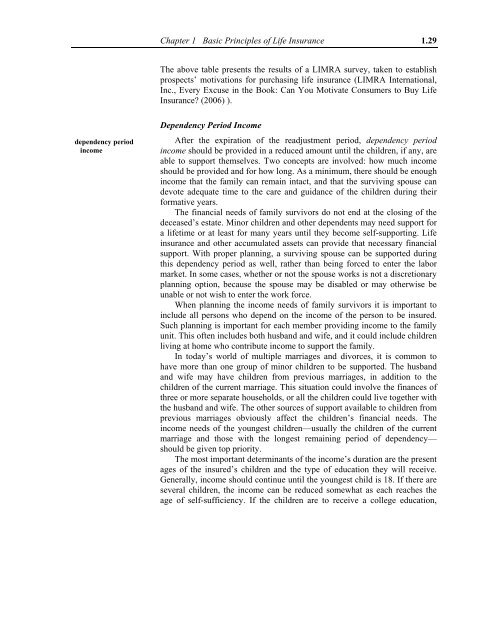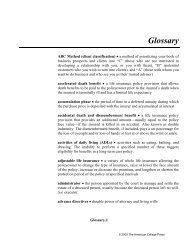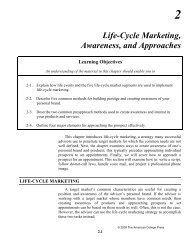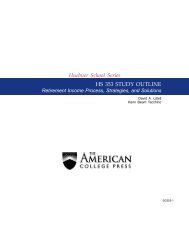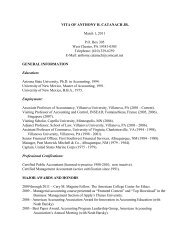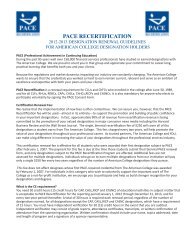Basic Principles of Life Insurance - The American College
Basic Principles of Life Insurance - The American College
Basic Principles of Life Insurance - The American College
You also want an ePaper? Increase the reach of your titles
YUMPU automatically turns print PDFs into web optimized ePapers that Google loves.
Chapter 1 <strong>Basic</strong> <strong>Principles</strong> <strong>of</strong> <strong>Life</strong> <strong>Insurance</strong> 1.29<br />
<strong>The</strong> above table presents the results <strong>of</strong> a LIMRA survey, taken to establish<br />
prospects’ motivations for purchasing life insurance (LIMRA International,<br />
Inc., Every Excuse in the Book: Can You Motivate Consumers to Buy <strong>Life</strong><br />
<strong>Insurance</strong> (2006) ).<br />
dependency period<br />
income<br />
Dependency Period Income<br />
After the expiration <strong>of</strong> the readjustment period, dependency period<br />
income should be provided in a reduced amount until the children, if any, are<br />
able to support themselves. Two concepts are involved: how much income<br />
should be provided and for how long. As a minimum, there should be enough<br />
income that the family can remain intact, and that the surviving spouse can<br />
devote adequate time to the care and guidance <strong>of</strong> the children during their<br />
formative years.<br />
<strong>The</strong> financial needs <strong>of</strong> family survivors do not end at the closing <strong>of</strong> the<br />
deceased’s estate. Minor children and other dependents may need support for<br />
a lifetime or at least for many years until they become self-supporting. <strong>Life</strong><br />
insurance and other accumulated assets can provide that necessary financial<br />
support. With proper planning, a surviving spouse can be supported during<br />
this dependency period as well, rather than being forced to enter the labor<br />
market. In some cases, whether or not the spouse works is not a discretionary<br />
planning option, because the spouse may be disabled or may otherwise be<br />
unable or not wish to enter the work force.<br />
When planning the income needs <strong>of</strong> family survivors it is important to<br />
include all persons who depend on the income <strong>of</strong> the person to be insured.<br />
Such planning is important for each member providing income to the family<br />
unit. This <strong>of</strong>ten includes both husband and wife, and it could include children<br />
living at home who contribute income to support the family.<br />
In today’s world <strong>of</strong> multiple marriages and divorces, it is common to<br />
have more than one group <strong>of</strong> minor children to be supported. <strong>The</strong> husband<br />
and wife may have children from previous marriages, in addition to the<br />
children <strong>of</strong> the current marriage. This situation could involve the finances <strong>of</strong><br />
three or more separate households, or all the children could live together with<br />
the husband and wife. <strong>The</strong> other sources <strong>of</strong> support available to children from<br />
previous marriages obviously affect the children’s financial needs. <strong>The</strong><br />
income needs <strong>of</strong> the youngest children—usually the children <strong>of</strong> the current<br />
marriage and those with the longest remaining period <strong>of</strong> dependency—<br />
should be given top priority.<br />
<strong>The</strong> most important determinants <strong>of</strong> the income’s duration are the present<br />
ages <strong>of</strong> the insured’s children and the type <strong>of</strong> education they will receive.<br />
Generally, income should continue until the youngest child is 18. If there are<br />
several children, the income can be reduced somewhat as each reaches the<br />
age <strong>of</strong> self-sufficiency. If the children are to receive a college education,


